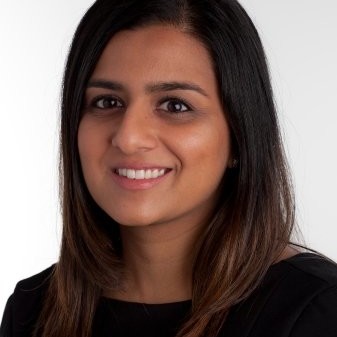Nupur Saksena, MBA2020, qualified with a Law degree in Australia and transitioned to the world of finance, via an internship at Goldman Sachs (Investment Banking). She is now undertaking a position at Partners Group (Private Debt) in London whilst she completes the final year of her MBA.
 What were you doing (and where) before you came to LBS?
What were you doing (and where) before you came to LBS?
Before LBS I was practicing as a corporate lawyer, specializing in restructuring and finance. I worked at Allen & Overy in London, and prior to that was at Herbert Smith Freehills in Sydney.
Why did you choose to undertake your programme at LBS? What was your motivation?
I really wanted to transition from being a lawyer into a more commercially focused role. Although I wasn’t 100% sure what I wanted to do, I knew I was interested in learning more about finance and also wanted to continue my career in London. Because I was looking to change my career I also wanted the benefit of having a longer programme where I could undertake multiple internships and and LBS ticked all these boxes.
Where are you now?
I have had the opportunity to complete two internships this summer. The first was at Goldman Sachs in their investment banking division, and I am now at Partners Group, a private equity fund, where I am working in their Private Debt team.
What specific events/services/activities in your time at LBS helped you get there?
The Career Centre and coaches were invaluable during the application and interview stage. LBS really makes you focus on your CV and cover letters early in the process, which at the time seemed unnecessary but in hindsight this took off a lot of the pressure when it came to actually applying for roles. I also received 1:1 support from the career coach for our stream and had interview practice with the banking leads before the investment banking interviews.
Beyond this, my fellow students and peer leaders have been a very good support network. A lot of my interview preparation was with other students going through the same process and I really would not be here without them.
Specifically for those looking to transition into Finance, my approach was to first figure out the different ‘finance’ roles that could be a possibility. I found going to the ‘Exploring careers in…’ presentations which are hosted by the Career Centre was the best way to understand this. At the beginning of the MBA I had no idea that finance included investment banking, private equity, asset management and everything in between!
In terms of preparation, it will serve you well to find out the interview process for the specific function you are recruiting for as early as possible and work to fill the skills gaps you have. For example, investment banking has technical interviews, private equity might include a modelling test and asset management might include making an investment recommendation. I knew that I would have to work hard on the modelling and the technical preparation, so I spent the first term and the winter break getting up to speed on these things so that I felt relatively prepared by January when interviews started.
Specific resources I used which I found particularly helpful were the Investment Banking Recruitment Guide which is published by the careers centre (this was my bible!) and I also read the very popular book by Joshua Rosenbaum on Investment Banking, which I found to be a fairly easy and comprehensive read for someone who is new to the industry. In terms of practical preparation I would recommend enrolling into one of the online modelling courses which you can do at your own pace – I don’t think it is necessary to do everything in these courses, but it will be useful if and when you do have to do a modelling test.
What skills did you have from your previous career that were applicable to your new role? How did you make those transferable skills clear to employers?
The biggest things for me were communication skills and project management. Your communication skills can be highlighted in every interaction you have with a potential employer, well before you even submit your application! Focus on concise emails, a well written CV and be thoughtful and engaging in your conversations with potential employers – I found this really helped me get my foot in the door to have a more formal interview.
For transactional skills, I focused on highlighting client interactions and dealing with stressful situations in my cover letters and CV and also showing some insight into how these skills would be useful in a new career or new role. These are both transferable skills and it is important not to discount these seemingly ‘general’ skills when you are applying to a specialist career.
What challenges or setbacks did you experience in transitioning from a specialist career? How did you overcome them?
I was recruiting for finance roles and the hardest thing for me was trying to convince finance professionals that I was able to add value without having any finance experience. This can be very frustrating and my advice is really to just be patient. It is important to find a company which values your experience and for me, this happened eventually when I just happened to speak to a finance professional who had a similar background to me and empathized and opened a few doors for me.
So with this in mind, the best thing to do is to leverage the network to speak to people who may have a similar background to you in the industry you are looking to enter and get their advice about their transition. I think career transitioners are (hopefully) more sympathetic to the struggles and are more likely to go out of their way to give their advice.
